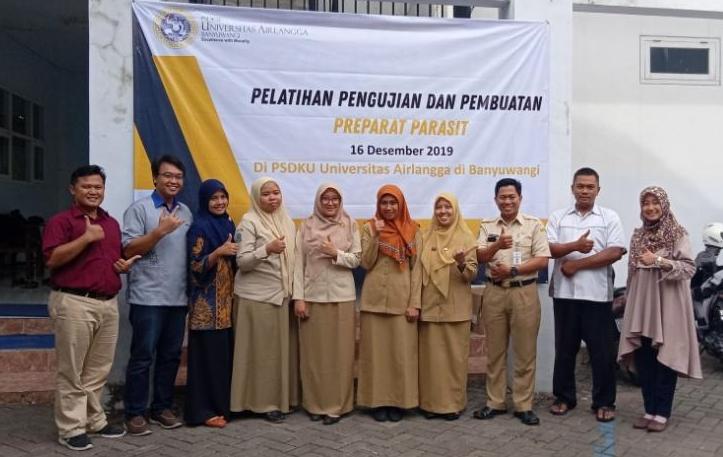UNAIR NEWS – Faculty of Fisheries and Maritime Affairs (FPK) with Faculty of Veterinary Medicine (FKH) Off Main Campus (PSDKU) Universitas Airlangga in Banyuwangi held training in testing and manufacturing of preparat parasite. The training was held specifically for employees of Fisheries Product Development and Quality Testing Laboratory (LPPMHP) of Banyuwangi Regency.
The event was directly opened by Aditya Yudhana, drh., M.Si as chief executive and speaker at the training. The lecturer who is familiarly called Adit explained the purpose of the research to increase the knowledge and competence of participants.
“The training can be used as a place for exchanging information to improve their knowledge,” Adit said.
The training was held at Laboratory of PSDKU Universitas Airlangga on December 16, followed by five employees of Laboratory of Fisheries Product Quality Development and Testing (LPPMHP) of Banyuwangi. There were lecturers from FPK and FKH PSDKU Universitas Airlangga in Banyuwangi.
The material presented consisted of 2 sessions about types of parasites that can attack fish and zoonotic nature (transmitted to humans) from parasites. The first session was delivered by Moh. Faizal Ulkhaq, S.Pi., M.Si and continued by Aditya Yudhana, drh., M.Si.
“Parasites that attack fish does not have a significant impact, but it can reduce the quality of fish being cultivated. Besides, several types of parasites are zoonotic in humans, “explained the FKH lecturer.
Parasite is currently being intensively carried out, to determine the type and impact both on fish that are cultivated and on humans who consume them. Thus, it can be used as an effort to prevent the spread of parasitic attacks.
In addition to getting material about parasites and their impact on humans, participants practiced directly making parasitic preparations. After going through the process of making parasitic preparations, participants identified the genus and species of the parasite.
“The training is expected to increase our competency knowledge so that we are aware of consuming fish as well as livestock and non-livestock,” he concluded.
Author: Dian Putri Apriliani
Editor: Nuri Hermawan





